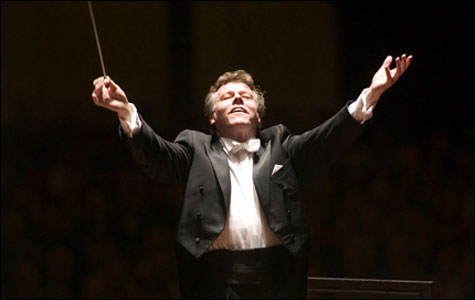
MARISS JANSONS: Challenging the BSO on its own turf. |
At the stirring memorial program for Craig Smith at Emmanuel Church last week (January 31, what would have been Smith’s 61st birthday — also Schubert’s birthday), the Reverend Edward Mark put at the top of his list of things he loved most about Craig Smith the weekly Bach cantatas that Smith inaugurated at Emmanuel 37 years ago as part of the Sunday liturgy (as they were in Bach’s time): “Deep, tough, devout — and in church! It’s a miracle!”
The program included short tributes by a dozen friends (mostly musicians) punctuating — and punctuated by — music dear to Smith (Bach, Schütz, Schubert, Mozart). They told hilarious stories about the famously disheveled and seemingly disorganized maestro. His dear friend Susan Zawalich reported how Smith himself loved to tell the one about the Brookline dowager who exclaimed, when he told her that he worked at Emmanuel Church, “Oh, you mean with that awful Craig Smith!” “Craig,” Zawalich concluded, “passionately believed that extremism in the defense of art was no vice.” None of the speakers shied away from the tough truths, about Smith’s failed kidney transplant or the periods of “troubles” with the church hierarchy about continuing Emmanuel Music.
More than 100 musicians, from among the earliest Emmanuel alumni to the stars of Smith’s Mozart and Handel collaborations with Peter Sellars and on to the current stellar personnel, poured into the altar space, part of the expanded choir or the expanded orchestra. Many who didn’t actually perform were part of the overflow crowd that came to pay respect. One common thread among the speeches was how cooperative musicmaking was under Smith, how much love and respect flowed back and forth, and how that love was reflected in their performances.
You could feel that love in every piece at the memorial. And the choices often reflected darker truths as well — Bach setting the words “Auf Erden bin ich nur ein Gast” (“I am only a guest on the earth”) and “Ich bin zum Sterben unerschrocken” (“I am unafraid of death”); Schütz setting “Sie ruhen von ihrer Arbeit, und ihre Werke folgen ihnen nach” (“They rest from their labors; and their works follow after them”). Mezzo-soprano Pamela Dellal floated her voice over the men’s chorus in Schubert’s heavenly “Ständchen” (“Serenade”), which is about waking one’s beloved to friendship and love and then letting her rest again. John Harbison, now acting director of Emmanuel Music, led Bach’s Cantata No. 127, Herr Jesu Christ, wahr Mensch und Gott (“Lord Jesus Christ, true Man and God”), with three of Smith’s closest associates: tenor Frank Kelley, baritone James Maddalena, and soprano Jayne West. The central aria, sung radiantly by West, is a longing for release. (It’s the source of “Auf Erden bin ich nur ein Gast.”) Two recorders (Christopher Krueger and Roy Sansom) tick out a steady pulse while the oboe (the sublime Peggy Pearson) sings a slow lullaby, winding around and out of the reach of the ticking recorders, yearning to leave time behind. “Craig’s tempos were always expansive,” Pearson said in her talk. “Toward the end, his performances got slower and slower. It was as if he never wanted them to end.”